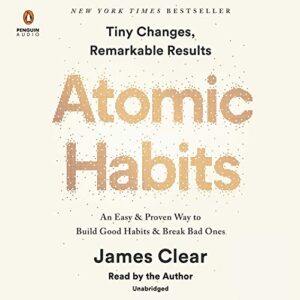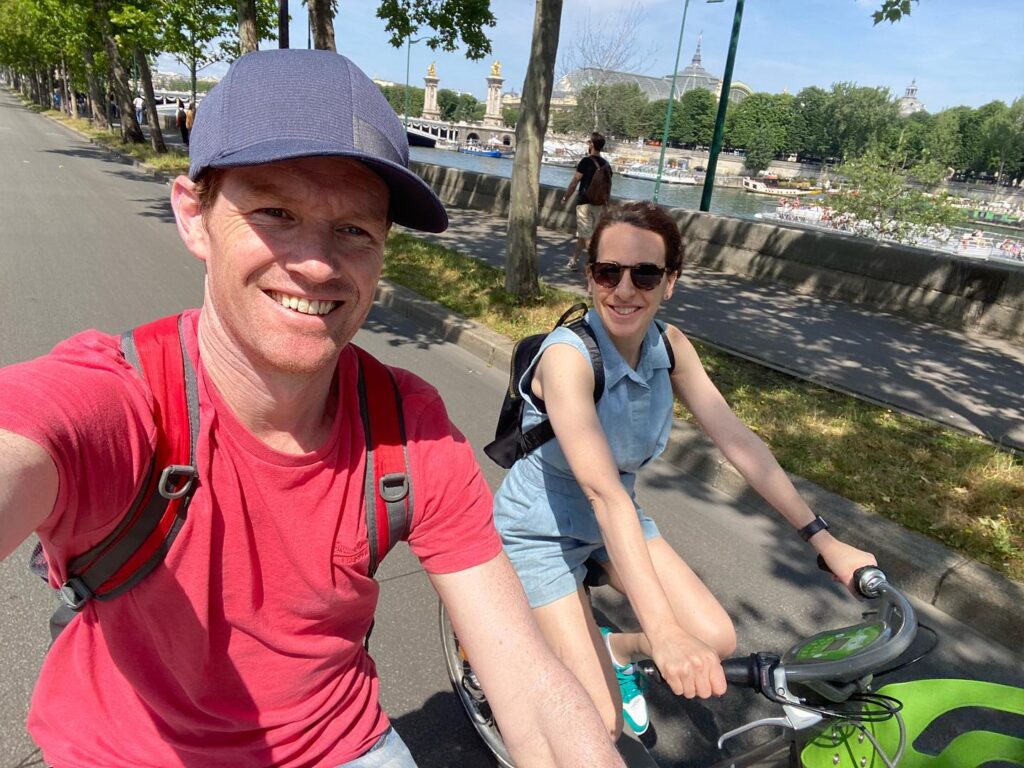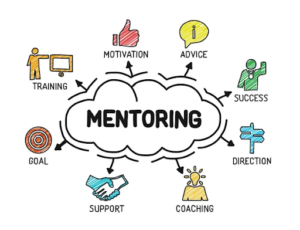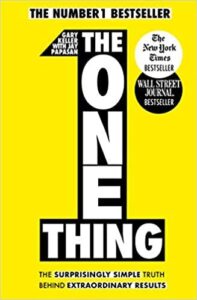I’ve recently turned 40, and as I enter my 5th decade, I’ve had lots time to reflect on the first four decades of my life, to think about some of my best moments, some of biggest wins, my toughest losses and unexpected outcomes, and would like to share these with you.
Quick disclaimer from the get go… I realise that a lot of my readers have a LOT more life experience than me. I’m certainly not here to tell you that I’ve got all the answers, I just want to share experiences I’ve had, lessons I’ve learned, in the hope that you can add them to your own toolbox of life hacks.
With that said, let’s dive in!
1. Focus on one thing at a time
Is there any simpler way to get more meaningful work done?
The One Thing, by Gary W. Keller and Jay Papasan, is still one of my favorites. It emphasizes the principle of focusing on the singular task or goal that, if accomplished, will make everything else easier or unnecessary.
The book argues against the notion of multitasking and encourages peoples to direct their attention and energy towards their most important work. It promotes the idea that success isn’t about doing more, but rather about doing less.
By narrowing your focus to ‘one thing’ at a time, you can yield higher productivity, reduce stress, and achieve more in less time. This ‘ONE Thing’ can apply to your personal life, work life, or any other area where you’re striving to achieve results.
I’ve found this to be true in my own life, in my business life but also in my personal projects as well.
2. Understand that it’s never too late to start something new
My most recent personal example is Italian, which I started studying just over a month ago and I’m LOVING it. If you’d like to find out about what I’m doing here, and how I’m trying to turbo-charge my learning, check out episode 72 of my podcast at The Growth Booth.
From a business standpoint, I hear about people well into their 60’s, 70’s and 80’s who are making breakthroughs, earning their first dollars online and setting up eCommerce stores for the first time.
One inspirational example of starting something new later in life is Colonel Harland Sanders, the founder of Kentucky Fried Chicken (KFC). Sanders worked in a variety of jobs throughout his life, from a steam engine stoker to a gas station operator.
At the age of 40, he began cooking for hungry travelers who stopped at his service station in Corbin, Kentucky. However, it wasn’t until Sanders was 62 and he had lost his job that he took his first $105 social security check and began visiting restaurants across the country, cooking batches of chicken for restaurant owners and their employees. If the reaction was favorable, he entered into a handshake agreement on the spot, negotiating franchise rights.
This was the beginning of what we know today as KFC, one of the world’s most popular fast-food chains. Sanders’ story is a strong example of how it’s never too late to start something new.
3. Don’t be afraid to ask for help when needed
There have been times in my life where I’ve hit roadblocks, and I realized that going at it alone sometimes doesn’t help, it just makes you more frustrated. We all need help sometimes, and asking for help from someone who has been through whatever it is you’re working through is one of the most effective ways to succeed.
4. Prioritize self-care and well-being
It’s easy to fall into the trap of treating yourself like a machine, at least from a work or online business perspective. Grinding your way to income through brute force is a common practice for a lot of people, but that’s hard to sustain and normally results in a collapse of some kind.
 Warren Buffett said it well (I’m paraphrasing):
Warren Buffett said it well (I’m paraphrasing):
“Imagine that you had a car and that was the only car you’d have for your entire lifetime. Of course, you’d care for it well, changing the oil more frequently than necessary, driving carefully, etc.
“Now, consider that you only have one mind and one body. Prepare them for life, care for them. You can enhance your mind over time. A person’s main asset is themselves, so preserve and enhance yourself.”
Buffett’s message emphasizes the importance of investing time, effort, and resources into maintaining and improving your physical health and mental capabilities. This highlights the principle of self-care and lifelong learning, reminding us that we should value and take care of our health and wellbeing, as these are the key assets that we truly own in our lives.
5. Learn to say “no” without feeling guilty
This one comes easier to some people than others, and I can tell you that after over a decade working on this, it’s still something I keep working at. Opportunities are endless, and the more success you see, the more people will come to you to ask for things.
Charlie Munger, Warren Buffett’s long-time business partner said: “The difference between successful people and really successful people is that really successful people say no to almost everything.”
I think there’s a lot of truth in that.
6. Value experiences over material possessions
 When I look back at my first four decades, my most cherished memories and moments are not items, or physical things, they’re experiences.
When I look back at my first four decades, my most cherished memories and moments are not items, or physical things, they’re experiences.
I enjoy some nice things, I like traveling in business class, I like the fact that I have a holiday home in a beautiful spot in New Zealand, but the things that have made me happiest and feel most fulfilled are the small things.
Skimming stones in the river with my kids, dancing in the street with thousands of other happy people after Argentina won the Football world cup, going to a concert with my wife or swimming in the ocean.
People with much more life experience than me will tell you that this idea truly crystalizes when you get to later stages of life, so again, EXPERIENCES trump possessions every time.
7. Embrace failure as a learning opportunity
I can’t tell you the number of times I’ve failed… it’s FAR more than the number of times I’ve succeeded. Failing can feel like a sucker-punch, but at the moment when you’re most down, feeling most dejected, that’s when you need to get back up, and see what you can learn from the failure so that you can be better from it.
I remember when my Google Adwords account got shut down way back in 2007-2008. It was soul destroying, as a profitable campaign which I’d worked so hard on was destroyed in one day. When I look back now though, that was just a blip on the radar, and today I’m able to spend thousands of dollars on advertising every single day from other sources.
So again, embrace failure as a learning opportunity, this approach has never let me down.
8. Make time for hobbies and interests

I can remember my Grandma saying “All work and no play makes jack a dull boy”, and I think there’s so much truth to this. If you don’t have any hobbies or interests, you’re missing out. There have been times in my life when my focus has JuSt been on my work, and they’ve been the moments when my life has been most one-dimensional and unbalanced.
Sometimes you need to actively look for something that interests you, and it’s not until you start doing it that it actually becomes interesting.
For me, right now I’m motivated by learning Italian, swimming, travel adventures with my family, following the Formula 1 (and even getting to watch some races live), and reading more books, just to name a few. I also put my podcast in the hobby bucket, because although it’s business related, I really enjoy it and it’s an outlet from other areas of my business.
9. Be intentional about who you spend time with
Toxic relationships are called toxic for a reason… people will either charge you up or drain you, they’ll either bring out the best in you, or bring out mediocrity, and there’s not much of a middle ground here.
It’s so much easier to be happy and successful when you’re surrounded by people who bring out the best in you in all areas of life.
10. Cultivate a growth mindset and lifelong learning
 As one of the professors at university used to say to me, “Aidan, even the best can get better”. He would say this almost every day, so much so that it became a bit of a joke, but he was right.
As one of the professors at university used to say to me, “Aidan, even the best can get better”. He would say this almost every day, so much so that it became a bit of a joke, but he was right.
James Clear, author of Atomic Habits says that “Habits are the compound interest of self-improvement. The same way that money multiplies through compound interest, the effects of your habits multiply as you repeat them. They seem to make little difference on any given day and yet the impact they deliver over the months and years can be enormous.”
This is also known as marginal gains.
James Clear also explains that if you improve by just 1% each day, over the course of a year you would become more than 37 time better… which is massive, and this is all down to the compounding nature of improvement, and is right at the heart of having a growth mindset in my opinion.
11. Let go of the past and focus on the future
You can’t change anything in the past, but you CAN change your future by focusing on what you’re doing today. This isn’t rocket science, it’s just common sense.
Ditch the baggage, ditch what you have or haven’t achieved in the past, because every day you start with a clean slate, and what you do today will have flow-on effects tomorrow. Use this to your advantage.
12. Maintain a balanced diet and regular exercise
Another nugget of wisdom from my Grandma is “An apple a day keeps the doctor away”.
The underlying meaning speaks to the value of consistent, small actions (like eating healthy and exercising) for maintaining good health and keeping illness at bay.
As a side benefit of exercising the body, I find I get my best ideas, and indeed my best clarity on ideas while working out, so in my experience exercise does far more than just help keep the waistline in check.
13. Don’t undervalue the importance of sleep
 Why We Sleep by Matthew Walker is another book that changed my understanding of the importance of sleep. The book is a MUST READ in my opinion, here are ten lessons you’ll learn in the book:
Why We Sleep by Matthew Walker is another book that changed my understanding of the importance of sleep. The book is a MUST READ in my opinion, here are ten lessons you’ll learn in the book:
- Sleep is crucial for good health.
- Lack of sleep impacts memory and learning.
- Poor sleep increases risk of diseases.
- Regular sleep schedule improves quality of life.
- Dreaming aids emotional processing.
- Sleeping pills don’t mimic natural sleep.
- Sleep deprivation affects societal safety.
- Napping can improve performance.
- Sleep positively impacts human development.
- Adequate sleep enhances creativity.
14. Embrace vulnerability as a strength, not a weakness
This means acknowledging your emotions and accepting that you’re human and not infallible. Vulnerability is often seen as a sign of weakness, but in reality, it takes courage to show your true self with all your strengths and flaws.
For example, traditional leadership often encourages leaders to maintain an image of strength and invulnerability. However, admitting you don’t know something, or that you’ve done something wrong, can help foster a culture of trust, openness, and mutual respect. It can help build stronger connections.
This is not only true in business, but in personal relationships such as parenting as well.
Embracing vulnerability isn’t about being weak, it’s about being courageous enough to show your authentic self, which in turn can inspire others to do the same.
15. Spend time outdoors to recharge and find inspiration
In an ideal world, for me this would me taking a walk along the beach, or in nature, but because I live amongst the hustle and bustle of Buenos Aires, I get my recharge by walking down a beautiful avenue, sometimes listening to music, and sometimes just absorbing what’s going on around me.
Like when I’m doing physical exercise, I get some of my best clarity and best ideas when I take time to go for a walk or just be outside in general.

Maybe a bit more than an afternoon walk…
16. Celebrate small wins as well as big victories
Motivation: Celebrating small wins helps to maintain motivation. It can often be challenging to stay motivated, especially when working towards large, long-term goals. This Ties in nicely with the ‘12 week year’ concept.
Progress tracking: Small wins are a way of tracking progress. They show that you’re moving forward, even if it doesn’t always feel like it.
Confidence building: Recognizing small victories helps to build self-confidence.
Positive psychology: Celebrating small wins fosters positivity and happiness. It encourages a positive outlook, which is an all around good thing
Momentum: Once you start accumulating these wins, it builds momentum, making it easier to achieve larger goals.
Small victories are the stepping stones on the path to larger achievements, and celebrating them can provide the motivation, confidence, and momentum needed to reach those bigger goals.
17. Practice mindfulness to stay present in the moment
I used the Headspace app for a long time, but now prefer Waking Up. Created by Sam Harris, it provides a pragmatic approach to mindfulness and is packed with useful and perspective building discussions as well as guided meditations.
18. Regularly express gratitude for what you have
Something I practise every day when i wake up is to think about three things I’m grateful for, three wins from yesterday, and three things I’m looking forward to today.
This simple routine takes about 60 seconds and I do it before I even get out of bed. I think the process of consciously thinking about what you’re grateful for goes a long way to keeping your feet on the ground and living a positive life.
19. Prioritize your mental health as much as your physical health
Holistic wellbeing, productivity and performance, quality of life, etc. A lot of the ideas we’ve spoken about already will help maintain balance in your life, which will go a long way to maintaining good mental health.
Think about mindfulness, exercise, diet, sleep, social connections, surrounding yourself with positive people, and so on.
20. Spend quality time with loved ones and nurture these relationships
 This is what it’s all about for me. My business is not the meaning for my life, it’s just one piece of the jigsaw puzzle. My relationships are what really matter, and the way to develop these and get the most out of them is to invest time in them.
This is what it’s all about for me. My business is not the meaning for my life, it’s just one piece of the jigsaw puzzle. My relationships are what really matter, and the way to develop these and get the most out of them is to invest time in them.
21. Recognize the importance of financial planning for the future
This awareness actually kicked off for me about two decades ago, I left home at 18 and for the first time, had to truly fend for myself. A friend of mine introduced me to Robert Kiyosaki of “Rich Dad Poor Dad“ fame, and that kick-started my interest in financial independence and in not relying on anyone else for my financial needs (Check out my Wealth Buidling framework here).
I think it’s also worth adding here that financial planning is not just for people who are doing well financially. I’d say it’s more important for people who are NOT free from the shackles of finance struggles, and there is a LOT you can do here to get ahead regardless of your situation. A couple quick points:
- Set aside a portion of your income for savings and investments can ensure a comfortable retirement or help you achieve financial goals such as buying a house or starting a business.
- Educate yourself on personal finance, create a budget, track your expenses, and save a portion of your income each month.
- At the same time, realise that day-jobs very rarely get people rich, which is fine, but if being wealth is an objective, then you need to start something on the side or at minimum start working on your investments.
22. Learn to accept and embrace change
I think change can be looked at from a perspective of FEAR, which is like looking at it through a scarcity based mindset, or OPPORTUNITY, which is looking at it through an abundance mindset…
And if you know change will happen, then you can choose how to approach it.
For instance, being open to new technologies and learning how to use them can enhance your professional skills and increase job opportunities in an ever-evolving digital world.
ChatGPT is a hot topic…
Fight it? Fear it? Or embrace it?
You get to decide.
Understand that change is inevitable and instead of resisting it, embrace it. View change as an opportunity for personal and professional advancement rather than a source of fear or uncertainty.
23. Embrace lifelong learning and don’t hesitate to seek expert advice or coaching
This is important for several reasons…
Continuous growth: This helps you adapt to change and enhances personal fulfillment.
Expertise: There are always people out there who know more than you, and they can help plug holes in your knowledge. One of the easiest ways to get ahead is to tap into external expertise. A couple examples was hiring a property coach for my first property, and learning from a wealth manager for smarter investment decisions.
Perspective: Sometimes, we can be too close to a situation to see it clearly. An outside expert, coach, or mentor can provide an objective perspective, helping us see things from a new angle or offering solutions we may not have considered.
Accountability: Engaging with an expert or coach often comes with a level of accountability, which can help keep us on track toward achieving our goals.
Business partners can be GREAT when it comes to embracing these four things.
In essence, embracing lifelong learning and seeking expert advice is about recognizing that we don’t have all the answers and being open to the wisdom and guidance of others. It’s a lesson in humility, growth, and the pursuit of excellence.
24. Cultivate a sense of humor to navigate through tough times
Don’t be too serious! Maintaining a sense of humor can help in coping with challenging situations. When faced with adversity or stressful moments at work, find ways to inject humor into the situation, whether it’s cracking jokes, finding the lighter side of things, or sharing amusing anecdotes with his colleagues.
Keep your feet on the ground, keep perspective. A terrible day for you might be a dream for someone else.
By infusing humor into tough times, you not only reduce stress but also create a more positive and enjoyable work environment for yourself and those around you.
25. Be open and receptive to feedback
Actively seeking input from others, whether it’s from colleagues, mentors, or friends, can provide valuable insights, identify areas for improvement, and promote growth.
Value constructive criticism as an opportunity for self-improvement and growth. When receiving feedback, listen attentively, ask clarifying questions, and take the suggestions to heart.
By being open and receptive to feedback, you continuously refine your skills, expand your knowledge, and develop a growth mindset that propels you forward.
26. Set boundaries in personal and professional relationships
This is essential for maintaining healthy work/life balance and dynamics.
For example, establishing clear communication expectations and respecting personal space can help prevent conflicts and promote mutual respect.
Establish clear boundaries with coworkers, make it known that you are not available for work-related calls or emails after office hours. This boundary allows you to maintain a healthy work/life balance so you can focus on personal and family time.
In my own business relationships, people know that I’m normally offline after 5pm… the days of being “available on demand” are long gone.
27. Keep exploring and fostering your curiosity
 Curiosity is a driving force for personal growth and fulfillment.
Curiosity is a driving force for personal growth and fulfillment.
Keeping a sense of curiosity alive by exploring new interests and ideas can lead to personal enrichment. Whether it’s delving into different cultures, learning new skills, or engaging in hobbies, embracing and encouraging your own curiosity fosters continuous learning and broadens horizons.
Actively seek out new experiences, whether it’s trying out different hobbies, attending workshops, or exploring unfamiliar subjects. Understand that by nurturing your curiosity, you can expand your knowledge, develop new skills, and gain fresh perspectives. Exploring different interests and embracing curiosity also brings joy, excitement, and a sense of fulfillment to life.
28. Volunteer, give back to your community, be charitable
Volunteering or giving back to your community allows you to make a positive impact.
For charitable endeavours, I like to set this up on autopilot, and regularly give a planned amount. For several years now we’ve been donating to children in challenging situations in Venezuela and Colombia, but we’ve also done other things like build schools in India.
One thing I’ve found is that the more you give, the more generous you are, the more you actually receive. I didn’t come up with this idea, I’ve seen other people talk about it as well, but I’ve certainly found it to be true.
Giving back doesn’t need to be financial either, there are lots of things you can do to help others, the key in my mind is to set aside time or money to help others, without expecting anything back in return.
29. Travel to expand your perspective and worldview

I was incredibly fortunate to live in the UK for a year as a 12 year old. That move ignited a passion for travel in me.
Since then, I’ve visited over 50 countries and hundreds of cities around the world, countless national parks, natural wonders, and truly majestic places. These days with a young family, I spend about a month or two each year travelling with them, and we all love it.
Travelling opens my eyes to other ideas and perspectives, and other ways of doing things.
My favorite places to visit are those rich in culture and history, and I always seek out learning opportunities in these places, especially where there are things I can use as examples and life experiences for my kids.
Travelling doesn’t have to mean globe-trotting and it doesn’t need to be expensive either. Depending on where you live, you may be able to get to incredible new places without needing to fly, and you can certainly do it on a shoe-string budget. I remember my wife and I once surviving on about $20-$30 per day while backpacking in europe in our early 20’s.
There are so many upsides to travel, I think it’s one of the best ways to spend your time and money.
30. Learn to let go of past baggage, freeing yourself from old resentments and regrets
Holding onto past hurts or mistakes can consume a lot of mental and emotional energy, acting as a heavy weight that prevents us from moving forward. This baggage can taint our perspective, influence our current and future relationships, and even impact our mental health.
By learning to let go, we can free up this energy to focus on the present and future. It allows us to forgive ourselves and others, reducing stress and creating space for more positive emotions like peace, joy, and hope. This doesn’t mean forgetting or excusing what happened, but rather accepting it, learning from it, and choosing not to let it dominate our thoughts and actions moving forward.
Furthermore, letting go can lead to personal growth. It often requires a lot of self-reflection and understanding, helping us to gain insights about ourselves and how we interact with others. This can make us more resilient, improve our relationships, and lead to a more fulfilling, happier life.
So, letting go of past baggage isn’t just about moving past old hurts; it’s about making a conscious choice to focus on our own growth, wellbeing, and future happiness.
31. Read widely to continually expand your knowledge
 Reading is one of the cheapest ways to learn from some of the smartest and most interesting people to have ever lived. It’s mind-boggling really… I can learn from Warren Buffett about investing… I can learn from Elon musk about innovation… I can learn from Michael Jordan about elite sports training, and so on… all for the price of a pizza.
Reading is one of the cheapest ways to learn from some of the smartest and most interesting people to have ever lived. It’s mind-boggling really… I can learn from Warren Buffett about investing… I can learn from Elon musk about innovation… I can learn from Michael Jordan about elite sports training, and so on… all for the price of a pizza.
Kindle, Audible, Paper… it doesn’t matter. Spend time reading VALUE, not crap. Avoid wasting your time on social media feeds, redirect it to reading something that will improve you as a person. It doesn’t need to be boring, in fact I recommend diving into the areas that interest you the most. It can get addicting and can lead to massive personal growth.
Diversity is the spice of life, and I think this is true for reading as well. Check out my reading list here to see what I’ve been reading lately.
32. Value time over money
Valuing time over money means treasuring experiences, relationships, and personal growth over material possessions. Instead of solely chasing financial success, focus on activities and connections that bring joy, fulfillment, and long-term happiness.
I sometimes ask myself the question “What would my 10 year older self advise me to do”, and the answer is almost always the same… spend time wisely doing things that make me truly happy, don’t flitter life away by wasting time doing things you don’t enjoy, or being a slave to the corporate machine.
I enjoy business a lot, but it never dictates what I can or can’t do, and this is why I always talk about building a lifestyle business, one that can bend to fit your dream lifestyle. Affiliate marketing and ecommerce are great for this.
Recognize that time is a limited resource and that nurturing meaningful relationships and creating lasting memories are far more valuable than material possessions. True happiness and fulfillment come from the connections we cultivate and the experiences we share with loved ones.
33. Embrace your age and where you’re at in life
 I say this from the viewpoint of a forty year old who is still very much working this out.
I say this from the viewpoint of a forty year old who is still very much working this out.
Tony Robbins talks about the Seasons of Life, and how we roll through different periods. The idea is that life is like a series of seasons, each with its own characteristics and tasks. These seasons serve as a metaphor for the different phases of our lives and the cycles of growth and change we experience.
Spring: Spring is the season of learning and opportunity. It’s about starting anew, planting seeds, setting goals, and facing challenges head-on. Just as spring in nature is a time of growth and renewal, this is a stage of life where we are learning, growing, and developing.
Summer: Summer is the season of action. It’s about hard work, protecting and nurturing what we’ve planted, and dealing with the heat of life’s challenges. In our personal lives, this can represent the stages where we are working hard, maybe building our careers, and dealing with the challenges that arise.
Autumn: Autumn is the season of harvest. It’s about reaping what you’ve sown, enjoying the fruits of your labor, and recognizing your progress. This can symbolize a period in our lives where we start to see the results of our hard work, perhaps achieving career success, or realizing personal goals.
Winter: Winter is the season of reflection, rest, and planning. It’s about facing harsh realities, learning from mistakes, and preparing for the new cycle (Spring) ahead. This can also mirror stages in our lives where we slow down, reflect on our journey, learn from our experiences, and plan for the future.
Tony Robbins emphasizes the importance of recognizing and embracing the season we’re currently in. Each season carries its own challenges and rewards, and each is necessary for our growth and development. By accepting and understanding the nature of these life seasons, we can navigate life’s challenges more effectively and live more fulfilled and meaningful lives.
I have seen a couple of definite seasons in my life so far…
My first 20 years, maybe even 30 years, were about learning who I was and being happy about that. Over the past 10-20 years I’ve doubled down on my strengths and worked hard to build a foundation that delivers my dream life.
I’m not sure what the years ahead will bring, but I know they’ll bring their own sets of challenges and opportunities. When I’m able to maintain perspective of where I’m at and the season I’m in, I feel like I’m at my very best to confront them.
34. Practice patience and understand that good things take time
 I sometimes share the story of a bamboo tree, and how If you plant it and give it enough water, the right kind of soil, and enough exposure to sunlight, you will still not see any visible growth in the first year.
I sometimes share the story of a bamboo tree, and how If you plant it and give it enough water, the right kind of soil, and enough exposure to sunlight, you will still not see any visible growth in the first year.
If you continue to nurture the bamboo tree, even after the second year, there will be no changes. And if you choose to continue on for the third and fourth year, still, no growth will be visible.
But, in the fifth year, something amazing happens. The bamboo tree that you planted can grow up to 80 feet (about 25m or 8 stories) tall in just six weeks!
Why is that so? For all of those first four years, when the bamboo tree is growing, everything is happening UNDERGROUND, so you can’t see its growth.
Because of its height, it requires strong foundations. The root system is developed to support its upward growth, so it can grow that 80 feet above the ground.
I think the story of the bamboo tree provides a good parallel with many things in life, and that you reap what you sow, and sometimes, most of the time, good things really do require time and energy.
In the business world this is certainly true. Overnight successes don’t really exist in my experience, and things that seem too good to be true normally are.
But if you remain patient, focused, and committed to your vision, you can succeed.
35. Learn to appreciate solitude

Learning to appreciate solitude provides valuable time for self-reflection, introspection, and personal recharge. Taking moments to be alone can help you reconnect with your thoughts, values, and desires, fostering self-awareness and personal growth.
Make it a habit to spend time alone, engaging in activities such as journaling, meditating, or taking peaceful walks in nature. By embracing solitude, you create space for self-reflection, introspection, and rejuvenation.
Value the quiet moments of solitude that allow you to reconnect with your thoughts, recharge your energy, and gain clarity on your goals and priorities. Appreciating solitude enables you to cultivate self-awareness, inner peace, and a stronger sense of self.
36. Recognize that it’s okay to outgrow friends
Throughout life, people change and evolve, and it’s natural to outgrow certain friendships.
For example, as people enter different stages of their lives, or different seasons as I was referring to in tip number 33, we often pursue diverse interests, or undergo personal growth. We may find that our values and priorities no longer align with those of our friends.
Recognizing that it’s okay to outgrow friends means acknowledging that relationships can naturally evolve and that it’s important to embrace new connections that support personal development and align with current goals and aspirations.
And just as you’ll outgrow some friends, you’ll naturally develop others. This is okay. People change, and there’s nothing wrong with that.
37. Develop your ‘street smarts’ by staying informed and being aware of your surroundings
This is about reading situations and understanding people, and it goes beyond book smarts.
It involves practical understanding and situational awareness that can keep you safe, help you make better decisions, and enable you to navigate various social and professional situations with ease.
Staying informed about current affairs, community matters, and world issues helps you understand the broader context in which you and others operate. This understanding can shape your perspectives, inform your decisions, and make you a more engaged person.
The ability to read people and situations effectively is a key component of emotional intelligence. This skill can lead to stronger relationships, as it allows you to empathize with others, foresee potential conflicts, and adapt your behavior according to different situations.
Lastly, being well-rounded and street-smart can enhance your problem-solving skills, resilience, and adaptability. It prepares you to face unexpected challenges, seize opportunities, and effectively handle the diverse aspects of your personal and professional life.
Cultivating ‘street smarts’ is a worthwhile endeavor for anyone looking to lead a successful and fulfilled life, and certainly something I am trying to make my children aware of.
38. Find mentors who inspire you and seek their guidance

Finding mentors who inspire and guide you can be transformative.
Whether in a personal or professional context, mentors are individuals who have achieved success in areas that align with your aspirations. They offer guidance, share their experiences, and provide valuable insights.
I’ve had mentors for the past 20 years in a range of areas, normally multiple at any one time, and they’ve ALWAYS helped me shorten the growth curve in a dramatic way, to make better decisions, to avoid falling into traps, and to just do better in general.
We also have a mentorship program with Blueprint Academy, you can click here to sign up for our next intake (usually once or twice a year).
39. Cultivate resilience and understand that challenges make you stronger
Cultivating resilience is essential for overcoming obstacles and bouncing back from setbacks. Challenges are an inherent part of life, and viewing them as opportunities for growth can lead to personal development.
I’ve failed SO many more times than I’ve succeeded, and failing has built up a certain amount of resilience. Challenges and difficulties are part of the parcel of anything worth achieving, they’re part of building success, they’re simply a part of life. Resilience and becoming anti-fragile are powerful characteristics that have served me well.
40. Continually re-evaluate and redefine your personal definition of success
 Personal definitions of success can evolve over time as you pass through different seasons of your life. It’s important to regularly re-evaluate and redefine what success means to you and what is important to you to ensure you’re always pointing your ship in the right direction.
Personal definitions of success can evolve over time as you pass through different seasons of your life. It’s important to regularly re-evaluate and redefine what success means to you and what is important to you to ensure you’re always pointing your ship in the right direction.
For instance, typical success goals are often equated with achieving specific goals or reaching societal expectations, such as financial wealth or professional status.
However, through introspection and self-reflection, individuals may discover that true success is more aligned with personal fulfillment, well-being, and meaningful connections. Continually re-evaluating and redefining success allows us to align our goals and aspirations with their evolving values and find a sense of fulfillment on their own terms.
Final thoughts
This wraps up my 40 life lessons at 40, and I feel that I am on a journey of continuous improvement. I hope you enjoyed them and add them to your own life, and I’m sure many of you have your own hacks and life stories no matter what your age, please share them below!








Thanks, Aidan! I particularly like the points about ‘It’s never too late to start something new’ and ‘Value Time over Money’. As one of your older subscribers, I’m totally with you onn these points. Thanks for continuing to inspire us!
Absolutely loved your ’40 life lessons at 40′, Aidan! You’ve packed so much wisdom and life experience into one inspiring post!
Referring to #17, I’m going to try the Waking Up app you recommend, thanks
This is beautiful Aidan. Cheers to 40!
Thanks for putting this into a blog post! Loved the episodes on the podcast but this is easier to come back to. Full of inspiration just the same. 🙂
Of all these, the sense of humor lesson is the one that’s resonated with me the best. Some of us underestimate how laughter can get us through a lot!!
Lots of lessons for what I’m sure is a beautiful life. Happy 40th
I feel lucky as a 20-something to learn from the success of people like you. Thanks for all you do man, can’t believe all this wisdom is for free!